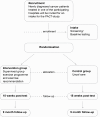Physical Activity during Cancer Treatment (PACT) Study: design of a randomised clinical trial
- PMID: 20534147
- PMCID: PMC2927992
- DOI: 10.1186/1471-2407-10-272
Physical Activity during Cancer Treatment (PACT) Study: design of a randomised clinical trial
Abstract
Background: Fatigue is a major problem of cancer patients. Thirty percent of cancer survivors report serious fatigue three years after finishing treatment. There is evidence that physical exercise during cancer treatment reduces fatigue. This may also lead to an improvement of quality of life. Such findings may result in a decrease of healthcare related expenditures and societal costs due to sick leave. However, no studies are known that investigated these hypotheses. Therefore, the primary aim of our study is to assess the effect of exercise during cancer treatment on reducing complaints of fatigue and on reducing health service utilisation and sick leave.
Methods/design: The Physical Activity during Cancer Treatment study is a multicentre randomised controlled trial in 150 breast and 150 colon cancer patients undergoing cancer treatment. Participants will be randomised to an exercise or a control group. In addition to the usual care, the exercise group will participate in an 18-week supervised group exercise programme. The control group will be asked to maintain their habitual physical activity pattern. Study endpoints will be assessed after 18 weeks (short term) and after 9 months (long term). Validated questionnaires will be used.
Primary outcome: fatigue (Multidimensional Fatigue Inventory and Fatigue Quality List) and cost-effectiveness, health service utilisation and sick leave. Secondary outcome: health related quality of life (European Organisation Research and Treatment of Cancer-Quality of Life questionnaire-C30, Short Form 36 healthy survey), impact on functioning and autonomy (Impact on functioning and autonomy questionnaire), anxiety and depression (Hospital Anxiety and Depression Scale), physical fitness (aerobic peak capacity, muscle strength), body composition and cognitive-behavioural aspects. To register health service utilisation and sick leave, participants will keep diaries including the EuroQuol-5D. Physical activity level will be measured using the Short Questionnaire to Assess Health-Enhancing Physical Activity and will be monitored with an exercise log and a pedometer.
Discussion: This study investigates the (cost)-effectiveness of exercise during adjuvant treatment of patients with breast or colon cancer. If early physical exercise proves to be (cost) effective, establishing standardised physical exercise programmes during cancer treatment will be planned.
Trial registration: Current Controlled trials ISRCTN43801571, Dutch Trial Register NTR2138.
Figures
References
-
- Le Cocq AMJ. Pakketbeoordeling oncologisch revalidatieprogramma Herstel en Balans. College voor zorgverzekeringen. 2006.
-
- NivelZorg- en maatschappelijke situatie van mensen met kanker in Nederland. 2005.
Publication types
MeSH terms
Associated data
LinkOut - more resources
Full Text Sources
Medical
Miscellaneous



